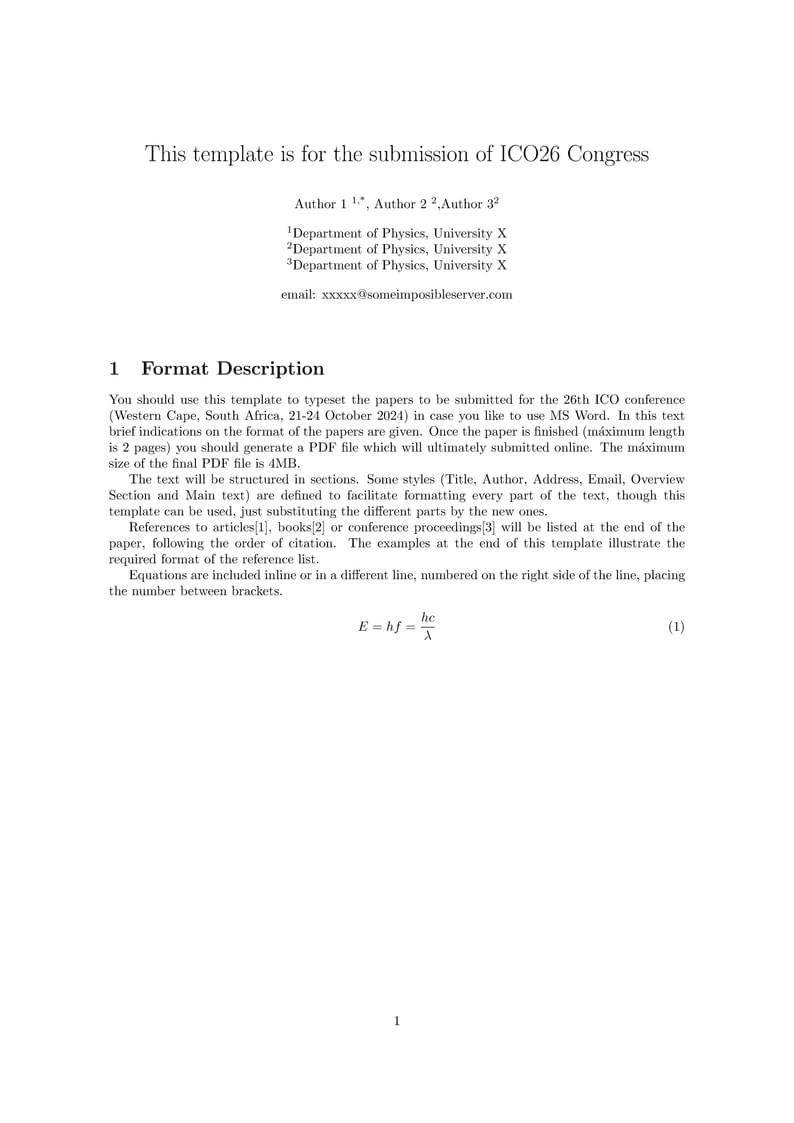
ICO 26 Abstract Submission
Author:
Y Ismail
Last Updated:
2 years ago
License:
Creative Commons CC BY 4.0
Abstract:
This was created for the submission of ICO26

\begin
Discover why over 25 million people worldwide trust Overleaf with their work.

\begin
Discover why over 25 million people worldwide trust Overleaf with their work.
\documentclass[letterpaper,10pt]{article}
\newcommand\authormark[1]{\textsuperscript{#1}}
\usepackage[a4paper, total={6in, 9.3in}]
{geometry}
%\usepackage[C]{fancyhdr}
\usepackage{graphicx}
\usepackage[colorlinks=true, bookmarks=false,citecolor=blue,urlcolor=blue]{hyperref}
\usepackage{fancyhdr}% http://ctan.org/pkg/fancyhdr
\fancypagestyle{default}{
\fancyhf{}% No header/footer
\fancyfoot[R]{\thepage}% Right footer
\renewcommand{\headrulewidth}{0pt}% No header rule
\renewcommand{\footrulewidth}{0pt}% A footer rule
}
\fancypagestyle{last-page}{
\fancyhf{}% No header/footer
\fancyfoot[C]{ICO26, Western Cape, South Africa, 21-24 October 2024}
}
\pagestyle{default}% Default page style
\AtEndDocument{\thispagestyle{last-page}}% Page style at \end{document}
\begin{document}
\date{}
\title{This template is for the submission of ICO26 Congress}
\maketitle
\vspace{-1.5cm}
\begin{center}
Author 1 \authormark{1,*}, Author 2 \authormark{2},Author 3\authormark{2}
\end{center}
% Add Affiliation of Authors below
\begin{center}
$^{1}${Department of Physics, University X}\\
$^{2}${Department of Physics, University X}\\
$^{3}${Department of Physics, University X}
\end{center}
\begin{center}
email: xxxxx@someimposibleserver.com
\end{center}
\pagestyle{empty}
\renewcommand\headrulewidth{0pt}
\vspace{0.5cm}
\section{Format Description}
You should use this template to typeset the papers to be submitted for the 26th ICO conference (Western Cape, South Africa, 21-24 October 2024) in case you like to use MS Word. In this text brief indications on the format of the papers are given. Once the paper is finished (máximum length is 2 pages) you should generate a PDF file which will ultimately submitted online. The máximum size of the final PDF file is 4MB.
The text will be structured in sections. Some styles (Title, Author, Address, Email, Overview Section and Main text) are defined to facilitate formatting every part of the text, though this template can be used, just substituting the different parts by the new ones.
References to articles[1], books[2] or conference proceedings[3] will be listed at the end of the paper, following the order of citation. The examples at the end of this template illustrate the required format of the reference list.
Equations are included inline or in a different line, numbered on the right side of the line, placing the number between brackets.
\begin{equation}
E=hf=\frac{hc}{\lambda}
\end{equation}
\newpage
\section{Tables and Figures}
This section contains information about the formatting of tables and figures can be added as shown below.
\begin{table}[h!]
\centering
\begin{tabular}{||c c c c||}
\hline
Col1 & Col2 & Col2 & Col3 \\ [0.5ex]
\hline\hline
1 & 6 & 87837 & 787 \\
2 & 7 & 78 & 5415 \\
3 & 545 & 778 & 7507 \\
4 & 545 & 18744 & 7560 \\
5 & 88 & 788 & 6344 \\ [1ex]
\hline
\end{tabular}
\caption{Table to test captions and labels.}
\label{table:1}
\end{table}
%%%% Figure example
\begin{figure}[htbp]
\centering
\includegraphics[width=6cm]{figure.png}
\caption{An example of figure}
\label{fig:example}
\end{figure}
\section{Conclusion}
Include your concluding remarks here
\section*{Acknowledgment}
Acknowledge your funders etc
\begin{thebibliography}{99} %% use BibTeX or add references manually
\bibitem{ref1} A. Aaaaa, B. Bbbbb, C. Ccccc, “Title of Article”, Journal vol number, p. page number (year).
\bibitem{ref 2} A. A. Aaaa, B. Bbbbb, Title of Book (Publisher, City, year).
\bibitem{ref3} A. B. Aaaa, C. Dddd, “Title of Article”, in SPIE: xxxx, vol. xxx, pp. xxx-xxx (year).
\end{thebibliography}
\end{document}